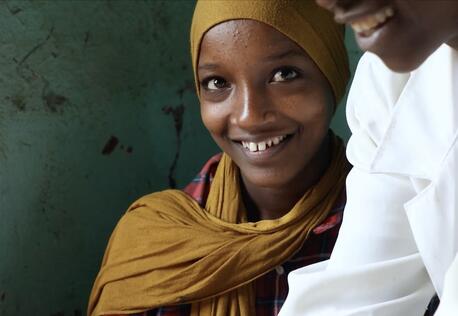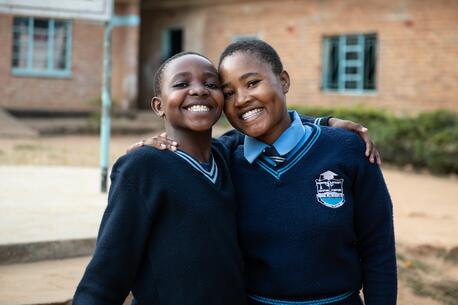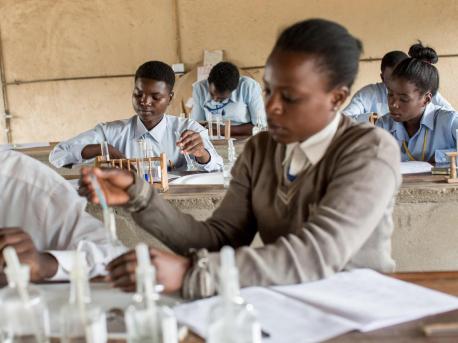
Women Continue Empowering Women and Girls Around the World
UNICEF USA partners with Dining for Women and Zonta International to promote equal rights and opportunities for women and girls.
Despite the notable global strides made in realizing the rights of women and girls around the world, more than 130 million girls are out of school. Twelve million are married before the age of 18 and more than 800 women die every day from complications during childbirth.
These stark statistics show the harsh reality many women and girls face every single day. Every child deserves to reach their full potential, but gender inequalities hinder this reality.
Sustainable gender equity can only be achieved when communities and individuals come together to make a collective impact
Sustainable gender equity can only be achieved when communities and individuals come together to make a collective impact. Civil society organizations — particularly women's organizations — in collaboration with UNICEF USA continue to support UNICEF's work for the most marginalized women and girls around the world by raising their voices, fundraising for UNICEF's gender equity work and education communities locally and globally.
UNICEF USA's partners are breaking barriers of gender equity through ensuring that social protection systems are in place, access to education and health care is a possibility, and policies and programs are approached holistically to guarantee the inclusion of all women and girls.
This year's Commission on the Status of Women focused on social protection systems, access to public services and sustainable infrastructure for gender equality and the empowerment of women and girls
In March, women leaders from around the world came together in New York for the 63rd annual session of the Commission on the Status of Women (CSW). The CSW is the principal global intergovernmental body exclusively dedicated to the promotion of gender equality and the empowerment of women. It is instrumental in promoting women's rights, documenting the reality of women's lives around the world and shaping global standards on gender equality and the empowerment of women. During the Commission's annual two-week session (March 11 - 22, 2019), representatives of United Nations Member States, civil society organizations and U.N. entities gathered at the U.N. headquarters in New York.
For UNICEF USA, the CSW is a time for our partners to come together and share their continued work supporting women and girls around the world. It is a place for our partners to learn from one another, break barriers, build bridges and determine tangible action items to continue moving the needs of gender equity forward. The foundation of these partnerships is the commitment to women and girls and building a future where all girls have access to an education, have a voice and choice when it comes to their bodies, and have equal access to health services so they can survive and thrive for generations to come.
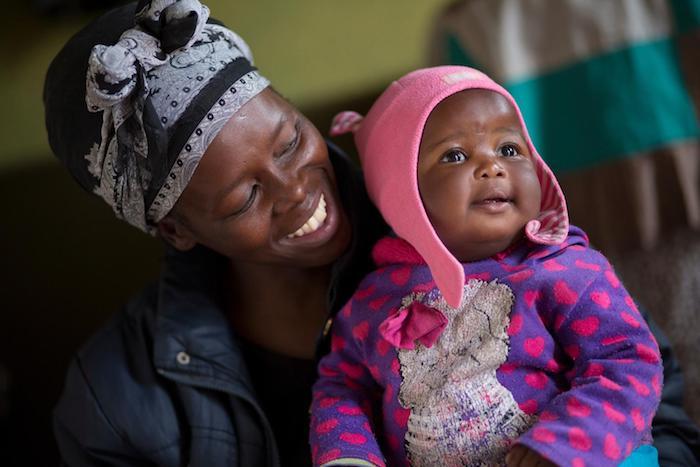
Siphiwe Khumalo, 37, and her baby daughter, Lundiwe, in South Africa. © UNICEF/UNI186633/Schermbrucker
Together with our partners Dining for Women and Zonta International, UNICEF USA organized two CSW parallel events, Achieving Sustainable Impact: Gender Equity Through Social Protections Is Imperative and Making It Stick: Sustainable Impact for Girls Through Innovation, Social Protection and Capacity-Building, respectively.
Panelists at both events focused on the importance and value-add of partnership and inclusion of multiple stakeholders at the table to continue advocating for the rights of all women and girls.
For the second biennium in a row, Zonta International is supporting Let Us Learn Madagascar
Founded in 1919, Zonta International is a leading organizaion of professionals empowering women worldwide through service and advocacy. Zonta International has partnered with UNICEF USA since 1972. Currently celebrating their centennial year, Zonta's commitment to supporting women and girls is the primary focus of their support to UNICEF.
For the second biennium in a row, Zonta is supporting Let Us Learn Madagascar, a program that tackles the issue of equity and innovations, explicitly addressing girls' education at the post-primary level. "I was convinced from the first time I read about this project," said Dr. Susanne von Bassewitz, President of Zonta International, speaking to the power of the Let Us Learn program. She emphasized the importance of continuing to provide these life skills to the most marginalized girls in Madagascar and the continuation that is needed in order to achieve the Sustainable Development Goals (SDGs), specifically Goal 5, to achieve gender equality.
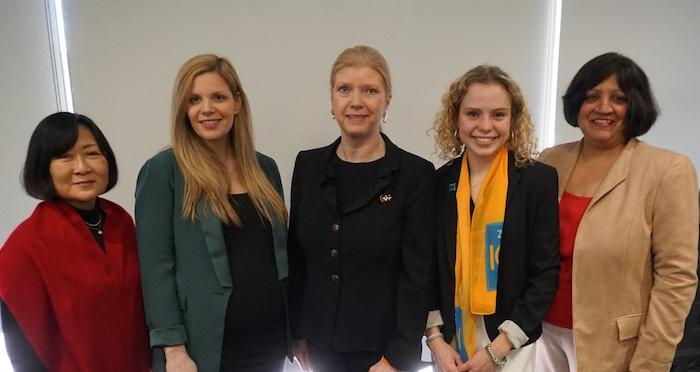
From left: Susan Cummings-Findel, philanthropist and founding donor of the Let Us Learn program; Caitlin McCurn, Deputy Director of Global Programs at UNICEF USA; Dr. Susanne von Bassewitz, President of Zonta International; Aysha Emmerson, Zonta Youth Observer; and Dr. Veena Khandke, Director of Grants and Partnerships at Dining for Women, after they spoke as panelists at the Making It Stick parallel event during the Commission on the Status of Women in March 2019. © Zonta International
Zonta International is also the first private-sector donor to support The Global Program to Accelerate Action to End Child Marriage. In 2016, UNICEF, together with the United Nations Population Fund (UNFPA), launched a global program to tackle child marriage in 12 of the most high-prevalence or high-burden countries. The UNFPA-UNICEF Global Program to Accelerate Action to End Child Marriage promotes the rights of adolescent girls to avert marriage and pregnancy and enables them to achieve their aspirations through education and alternative pathways.
During the CSW, Zonta International spoke to the connections both programs have, and the advancements both programs will enable towards achieving gender equality. President von Bassewitz mentioned that we must all "be agents of the change we want to see." She indicated that it is through these conversations that we can create change, whether that be through providing girls — some for the first time ever — with education, or ending the practice of child marriage.
We have to light the spark, and women and girls will move mountains to transform their own communities. — Dr. Veena Khandke, Director of Grants and Partnerships, Dining for Women
Dining for Women (DFW) is the world's largest educational giving circle focused on women and girls. It is dedicated to achieving gender equality and ending extreme poverty by investing in women and girls in the developing world and fostering global citizens here in the U.S. DFW chapters are small groups of people who gather monthly to share a meal, learn about the challenges affecting women and girls globally, and donate their "dining out" dollars to projects that promote gender equality.
Since 2017, DFW has partnered with UNICEF USA to provide urgent support to some of the most vulnerable and forgotten groups in our world today: Refugee women and girls in Bangladesh, Jordan and South Sudan. It is well documented that women and girls suffer the most during humanitarian crises.
Dining for Women provides urgent support to refugee women and girls in Bangladesh, Jordan and South Sudan
Through its partnership with UNICEF USA, DFW is supporting projects that provide safe and lawful employment to Syrian refugee women living in Jordan, while also addressing the need for maternal and newborn health care services in the refugee camps. It is also providing critical prevention and response services for women and children in South Sudan who are high-risk for gender-based violence. And DFW's most recent project will improve the maternal and newborn health of Rohingya refugees in the Cox's Bazar district of Bangladesh.
"Dining for Women helps empower women and girls, advocates for gender equality around the world and works to build systemic change," explained Beth Ellen Holimon, President of Dining for Women, at their recent CSW parallel event.
Addressing issues like gender-based violence, maternal health and climate change, panelists emphasized the deep value add of partnership, as well as the importance of engaging multiple stakeholders, in the continued progress for women and girls. "When women understand what their rights are, it changes everything," said DFW's Holimon.
From left: Panelists Laura Milton, Director of Marketing and Communications at African People and Wildlife; Sagri Singh, Senior Advisor of Gender and Development at UNICEF; Joanna Sherman, Artistic Director of Bond Street Theater; and Emily Bensen, Deputy Director at Integrate Health listen as Beth Ellen Holimon, President of Dining for Women, makes a point. © UNICEF USA / Emma Pfister
Partners like Dining for Women and Zonta International consistently prove that partnerships are critical to the advancement of gender equality in all walks of life. By encouraging their club and chapter members to speak up on these issues and be the empowered women they are, our partners are tirelessly paving a path for women and girls around the world.
Below are just a few ways you can take action today for women and girls:
- Learn more: Become more knowledgeable on UNICEF's lifesaving work to help the world's most marginalized women and girls.
- Get involved: Learn more about Dining for Women and Zonta International and how you can get involved with a club near you.
- Take action: Check out our Action Center and contact your legislators and local representatives to advocate for ending child marriage.
- Donate: Every dollar matters, and you can make a difference today for women and girls around the world.
- Contact us: Reach out to learn more ways you can partner with UNICEF USA and support UNICEF programs focusing on women and girls.
UNICEF USA is committed to continuing partnerships with women's organizations as their impact shows that women are empowering other women and that change can happen.
Learn more about UNICEF USA's partnerships with women-led organizations.
Top photo: Adolescent girls conduct experiments during chemistry class at UNICEF-supported Kamulanga Secondary School in Lusaka, Zambia. © UNICEF/UN0145557/Schermbrucker
HOW TO HELP
There are many ways to make a difference
War, famine, poverty, natural disasters — threats to the world's children keep coming. But UNICEF won't stop working to keep children healthy and safe.
UNICEF works in over 190 countries and territories — more places than any other children's organization. UNICEF has the world's largest humanitarian warehouse and, when disaster strikes, can get supplies almost anywhere within 72 hours. Constantly innovating, always advocating for a better world for children, UNICEF works to ensure that every child can grow up healthy, educated, protected and respected.
Would you like to help give all children the opportunity to reach their full potential? There are many ways to get involved.



